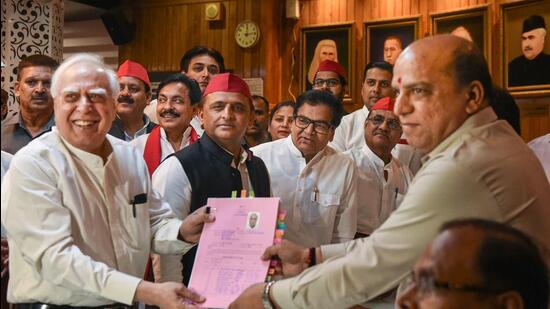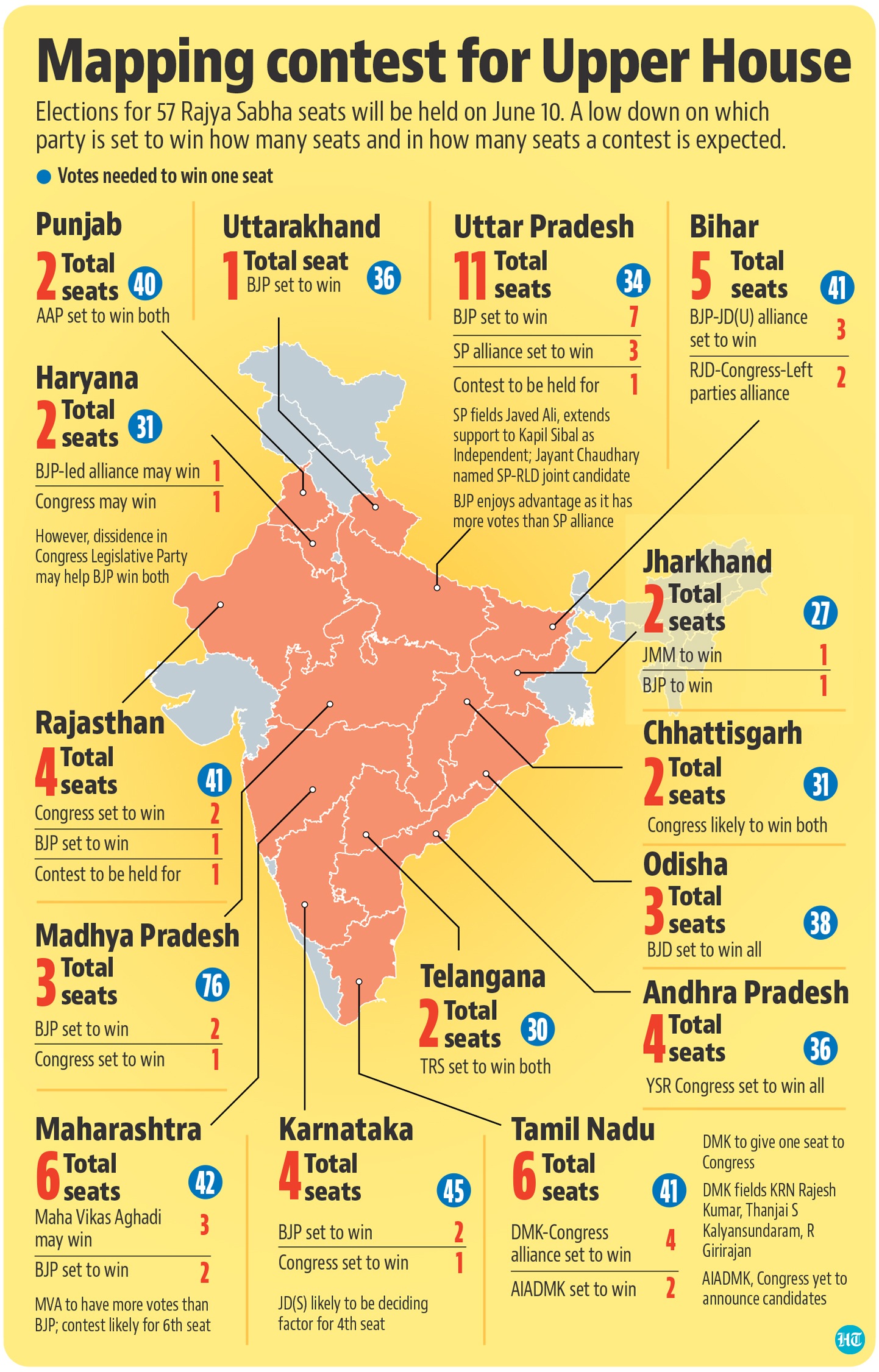Hectic parleys, lobbying begin ahead of battle for 57 Rajya Sabha seats
In Uttar Pradesh, the Bharatiya Janata Party (BJP) is keen on contesting eight of 11 seats going to polls in the state, even though it is short of the number of MLAs to win all eight, party leaders in Lucknow said.
The coming elections to 57 Rajya Sabha seats across 15 states on June 10 have triggered hectic discussions and lobbying across party lines.

While a contest is unlikely in states such as Andhra Pradesh, Telangana, Tamil Nadu, Punjab, Uttarakhand, Bihar and Madhya Pradesh, the picture will become clear on the last day of withdrawal of nominations on June 3.
In Uttar Pradesh, the Bharatiya Janata Party (BJP) is keen on contesting eight of 11 seats going to polls in the state, even though it is short of the number of MLAs to win all eight, party leaders in Lucknow said.
The Samajwadi Party (SP), on the other hand, is set to win three seats and is expected to field or support a fourth candidate to deny the BJP the eighth seat, party leaders said.
Uttar Pradesh sends 31 members to Rajya Sabha.
The BJP and its allies have a strength of 273 in the 403-member assembly while the opposition SP and its allies have a strength of 125.
The 11 seats will be falling vacant due to retirement of members between June and August.
Among those retiring from the state, five are from the BJP, three from the SP, two from the Bahujan Samaj Party and one from the Congress.

In Rajasthan where four seats will fall vacant in July, the Congress is set to win two seats while the opposition BJP is set to secure one. An interesting contest is likely for the fourth seat (in Rajasthan, 41 first preference votes are required to win a Rajya Sabha seat , which means the Congress will be left with 26 extra votes, and the BJP, 30)
In the 200-member Rajasthan assembly, the ruling Congress has 108 members while the BJP has 71 and its ally RLP has 3. Both parties are yet to announce their candidates for the Rajya Sabha elections. There are 13 independent MLAs whose role will be crucial.
In Bihar, where five seats are set to fall vacant in July, the BJP-Janata Dal (United) alliance is set to win three and the opposition Rashtriya Janata Dal (RJD)-Congress alliance is set to win the remaining two.
The RJD, which declared Misa Bharati and Fayaz Ahmed as its two candidates, is reluctant to give one of the nominations to the Congress, party leaders said.
Meanwhile, uncertainty continues to loom over the nomination of Union steel minister and JD(U) leader Ramchandra Prasad Singh amid opposition within the party to his candidature.
The Jharkhand Mukti Morcha (JMM)-Congress alliance and BJP are set to win a seat each in Jharkhand. Both the JMM and Congress are yet to finalise their candidate.
Chief minister Hemant Soren is expected to meet Congress president Sonia Gandhi in the coming days to decide on the candidate, JMM leaders said.
In Maharashtra, where six seats are going to fall vacant in July, the Maharashtra Vikas Aghadi (MVA) is set to win three seats. The opposition BJP is set to win two.
The MVA has more votes than the BJP and has a chance of winning the fourth seat with some defections.
Former Rajya Sabha member Sambhajiraje Chhatrapati, who is a descendant of Chhatrapati Shivaji Maharaj, has been seeking support both from the MVA and BJP as an independent.
Last week, Sambhajiraje approached the Shiv Sena (part of MVA), which assured support provided he joined the party. However, he declined the proposal.
The Sena on Tuesday fielded Kolhapur district president Sanjay Pawar for the sixth seat. The Sena’s other candidate is Sanjay Raut.
Of the four seats in Karnataka, the BJP is expected to win two and Congress one. The Janata Dal (Secular) could be the deciding factor for the fourth seat.
None of the parties have declared their candidates so far.
For two seats in Haryana, BJP leaders said it may field an independent candidate in addition to a party candidate to take advantage of the infighting within the Congress.
Several members are set to retire on different dates between June and August. According to established practice, counting will take place an hour after the conclusion of polling on June 10.
(With inputs from state bureaus)






